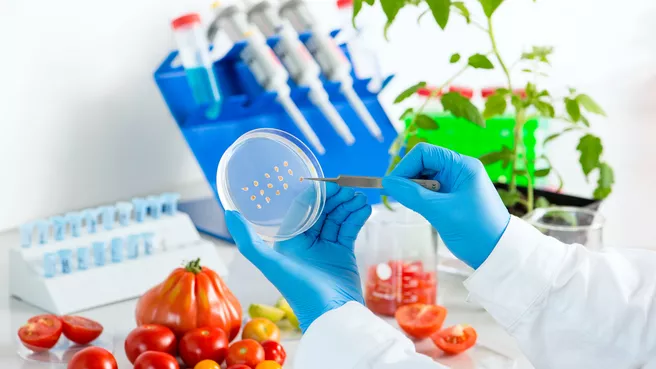Plants form the nutritional basis for virtually all life on earth. Protein-rich foods from crops are essential for feeding the world’s growing population and simultaneously in light of climate change. “While crop genomes are increasingly being elucidated, little is known about the proteomes of these plants” says Bernhard Küster, Professor of Proteomics and Bioanalytics at the TUM School of Life Sciences and head of the PhD program. “Proteomes are the set of proteins that carry out and control almost every aspect of life,” says Bernhard Küster, Professor of Proteomics and Bioanalytics at the TUM School of Life Sciences and head of the PhD program.
Investigating the 100 most important crops for human nutrition
The overall scientific goal of the International Doctorate Program “The Proteomes that Feed the World” is to map the proteomes of the world’s 100 most important food crops. PhD students will also perform research on how to improve yields, to understand the interaction of plants with insects, microbes, the soil and climate, how crop proteomes respond to stress factors such as pathogens and pests, and how they cope with heat and drought, which are exacerbated by climate change.
Building an international network
The future doctoral students of the International Doctorate Program “The Proteomes that Feed the World” will receive comprehensive training in research, management, and communication at TUM. In describing this special promotion of gifted students by the Free State of Bavaria, Bernd Sibler, Bavarian State Minister of Science and the Arts, says, “With our International Doctorate Programs, we are creating opportunities for Bavarian universities to implement unusual and experimental formats in graduate education.”
To obtain the plant material for the 100 most important food crops, TUM cooperates, for example, with universities and industry partners in the USA, Iran, Saudi Arabia, Malaysia, China, and Australia, creating a world-wide network that extends to countries on all continents.
Furthering this international approach, more than half of the doctoral students will be recruited from abroad and all doctoral students will spend three months on the campus of one of the international partners. “In this way, the International Doctorate Program will also strengthen the emergence of a global community of researchers focused on plant research,” states Brigitte Poppenberger, Professor of Biotechnology of Horticultural Crops at the TUM School of Life Sciences, who co-leads the International Doctorate Program.
Excellent environment for interdisciplinary research
Research into crop plants as alternatives to animal protein sources is but one example of the broad range of ongoing research at the TUM School of Life Sciences. It includes the study of interactions between humans, animals, plants, microorganisms, the soil and the environment at scales ranging from the molecular level to cells, organisms and entire ecosystems.
“The Technical University of Munich at the Freising-Weihenstephan campus is ideally positioned for research at the highest level,” says Professor Küster. Researchers can draw on the extensive greenhouse and climate chamber capacities at the Plant Technology Center. The Chair of Proteomics and Bioanalytics and the Center for Biomolecular Mass Spectrometry (BayBioMS) one of the most powerful proteomics technology platforms in the world. Researchers also have access to a high-performance database that enables real-time data analytics of large amounts of proteomic, transcriptomic, and phenotypic data.
Further information:
Starting in 2022, the Elite Network of Bavaria will fund four new International Doctorate Programs for an initial period of four years. In addition to the new International Doctorate Program “The Proteomes that Feed the World” at TUM, Doctorate Programs at Friedrich Alexander University Erlangen-Nuremberg (FAU), the University of Regensburg, and Julius Maximilian University Würzburg (JMU) will also be funded.
The total funding of the four new Doctorate Programs in the first phase amounts to 12.5 million Euros. Support for the International Doctorate Programs may be extended to a second funding period”. The selection of the funded projects was based on a recommendation of an International Commission, which is composed of pre-eminent figures, chaired by the former president of the German Research Foundation (DFG) Prof. Peter Strohschneider.
Editing:
Susanne Neumann
TUM School of Life Sciences
Press and Public Relations
Scientific contact:
Prof. Bernhard Küster
TUM School of Life Sciences
Chair of Bioanalytics
Tel. +49 8161 71 5697
kuester(at)tum.de
